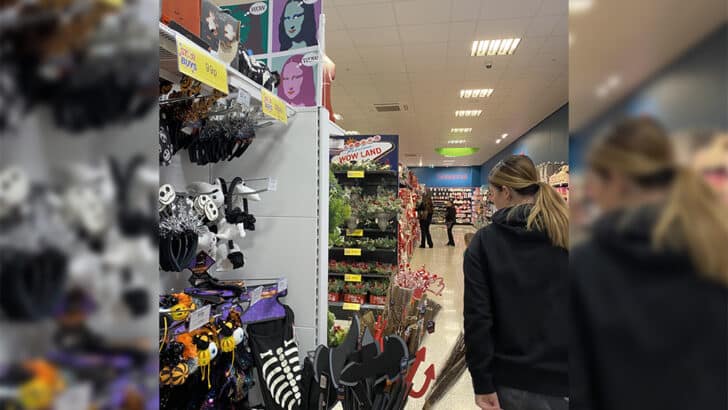Wandering down a shopping aisle in Belfast this week, the signs of the times were on display: pumpkins and skulls of Halloween on the right and left, and, straight ahead, the frosted glitter of Christmas baubles, with everything but the crib! Halloween, which marks the eve of All Saints, is upon us, but too often resembles the old pagan festival of Samhain, a night when the Celts wore disguises to ward off evil spirits.
Aaah, how appropriate for our times that there is no longer a decent gap, of time or space, between Halloween and Christmas. This is after all the age of pleasure, escapism, and choice. It is also the age of ‘Modern Paganism’, as Christ is being driven out of society, even his own birthday, with remarkable haste.
Exodus
As I journeyed down the store’s aisle, a lecture, “Christ the King and the Return of the Dark Gods” was echoing loudly. It was delivered this month by Gavin Ashenden, the former chaplain to Queen Elizabeth II, an Anglican bishop who entered the Roman Catholic Church in 2019. “Tragically, over the last 150 years,” said Ashenden, “our culture has been slowly and methodically emptied of Christ’s presence. Christ has been driven out of the schools, driven out of the instruments of government, driven out of the media , driven out of the professions, driven out of the public square, driven out of our literature, driven out of our imaginations”.
“There is nowhere they have not sought to drive Christ out and what have they left? They have left an emptiness.”
And what has filled the emptiness? Dark forces.
Jesus himself spoke, in Matthew 12:43-45 of how demons, once driven out, return to their old haunts, when they are well-ordered but vacant.
The spirit of anti-God is in every empty space”
Ashenden spoke of a dark trinity of destructive spirits found in the Old Testament, Baal, the spirit of anti-God, Ashtoreth, a female spirit of sexuality and perversion, and Molech, the spirit of death and destruction. Even those who don’t believe in what St Paul called ‘the principalities’ can surely recognise the principles at the heart of modern society: atheism, transgenderism, and abortion/assisted death.
The spirit of anti-God is in every empty space. Just recently, a 2024 edition of an Irish school textbook deleted any mention of Christmas. Last year the annual blessing of the Aer Lingus planes was cancelled and Dublin Council now celebrates a “Winter Lights” festival.
Paganism
‘Modern paganism’ is not a new term, by the way.
It was used by the writer and poet, TS Eliot in 1939. Eliot, an American who had settled in London, observed as the Second World War erupted, not only Nazis in Germany and Marxists in Russia, but a hidden truth: that the real values or gods of the so-called Christian western societies belonged to ‘modern paganism’.
This belief – that nothing is true and everything is permitted – creates a world where human life is cheap”
“Western democracies,” said Eliot, “had no positive principles. It’s just sheer indulgence and escapism. It is just liberalism and tolerance. But that is a negative culture. These lack substance and they will be eventually dissolved and replaced by a pagan culture.”
And, what did Eliot’s “pagan culture” look like?
Well a lot like Irish society today: a culture dedicated to materialism, secularism and moral relativism (the idea that there is no universal or absolute set of moral principles. In other words ‘to each his own’).
This belief – that nothing is true and everything is permitted – creates a world where human life is cheap. Why? Because the great theological proposition that human beings are made in the image of God, and are therefore precious, is denied. (There is a reason Psalm 71 states that God frees us from oppression.)
Warnings
Ashenden warns that pagan culture is defined entirely by power, with the strong subjugating or discarding the weak, and the weak, economically dependent on the elite, doing what they can to survive.
“All pagan civilisation,” he said, “were slave empires. The more advanced they were, the more brutal.”
It was Venerable Fulton Sheen, the American bishop, who warned in 1970 that Christendom – an economic, political and social life inspired by Christian principles – was coming to a close. Sheen could see the signs of the times: the breakdown of family life, the rise of abortion and general immorality.
We can rebuild on the old foundations and our fortunes will be restored”
Now, we have more signs of a modern pagan culture: moves to restrict freedom through so-called “hate laws” and to introduce assisted dying. What are the chances that soon only the rich and powerful will have the privilege of old age? After all, only the ‘wanted in the womb’ currently enjoy the right to life.
God promises us in Isaiah that if we are faithful, we can rebuild on the old foundations and our fortunes will be restored.
So in the aisle between the skulls and the snowman, see the signs of the times, and be aware of the choice: the creation of a new Christian culture, which lifts up the weak and the lowly, or the slavery of modern paganism, where only the strong are free.
So in the aisle between the skulls and the snowman, see the signs of the times, and be aware of the choice: the creation of a new Christian culture, which lifts up the weak and the lowly, or the slavery of modern paganism, where only the strong are free”
**
On Mission Sunday, I was reminded of a friend’s experience at a wedding in North America. The priest marrying the couple was African, and English was not his first language. He struggled through the homily. Afterwards, some of the guests grumbled about it. My friend spoke up: “I am not a priest. You are not a priest. My son is not a priest. Your son is not a priest. And if your son wanted to be a priest, you’d try to talk him out of it.” The subject was swiftly changed.
***
Bertie Ahern was right! I shared a podcast with him during lockdown and the former Taoiseach said that, in his experience, people will not necessarily go to Sunday Mass, but they will turn out in great numbers for devotions such as a novena or a special event. St Bernadette proves the point: as thousands are flocking to see her relics, and connect with the simple faith of this little saint.


 Martina Purdy
Martina Purdy
